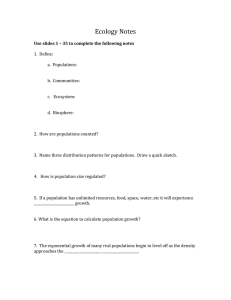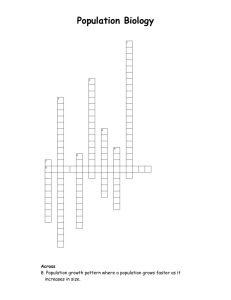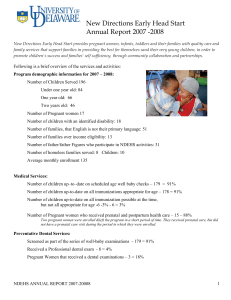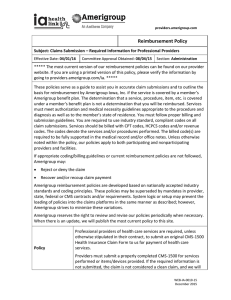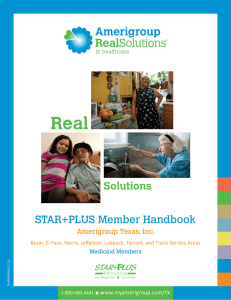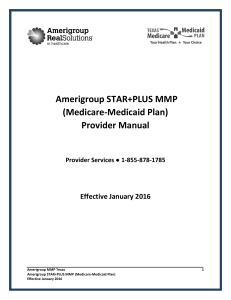Case management programs and care coordination
advertisement
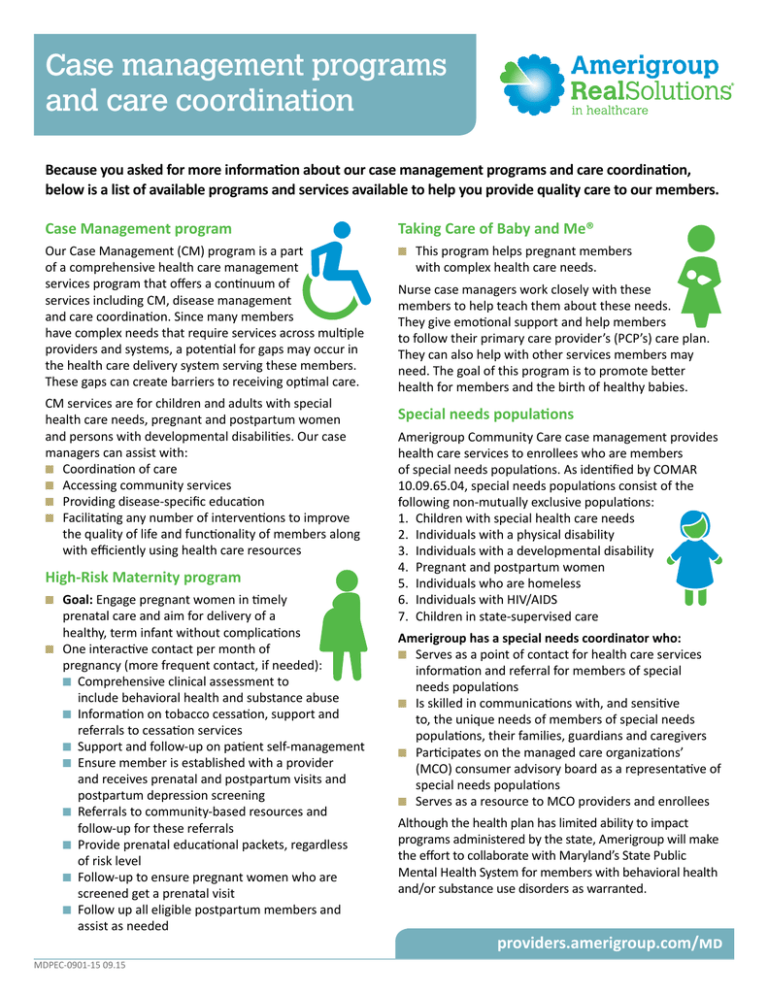
Case management programs and care coordination Because you asked for more information about our case management programs and care coordination, below is a list of available programs and services available to help you provide quality care to our members. Case Management program Taking Care of Baby and Me® Our Case Management (CM) program is a part of a comprehensive health care management services program that offers a continuum of services including CM, disease management and care coordination. Since many members have complex needs that require services across multiple providers and systems, a potential for gaps may occur in the health care delivery system serving these members. These gaps can create barriers to receiving optimal care. nThis program helps pregnant members CM services are for children and adults with special health care needs, pregnant and postpartum women and persons with developmental disabilities. Our case managers can assist with: n Coordination of care nAccessing community services nProviding disease-specific education nFacilitating any number of interventions to improve the quality of life and functionality of members along with efficiently using health care resources High-Risk Maternity program oal: Engage pregnant women in timely G prenatal care and aim for delivery of a healthy, term infant without complications nOne interactive contact per month of pregnancy (more frequent contact, if needed): ­ nComprehensive clinical assessment to include behavioral health and substance abuse ­ nInformation on tobacco cessation, support and referrals to cessation services ­ nSupport and follow-up on patient self-management ­ nEnsure member is established with a provider and receives prenatal and postpartum visits and postpartum depression screening ­ nReferrals to community-based resources and follow-up for these referrals ­ nProvide prenatal educational packets, regardless of risk level ­ nFollow-up to ensure pregnant women who are screened get a prenatal visit ­ nFollow up all eligible postpartum members and assist as needed n MDPEC-0901-15 09.15 with complex health care needs. Nurse case managers work closely with these members to help teach them about these needs. They give emotional support and help members to follow their primary care provider’s (PCP’s) care plan. They can also help with other services members may need. The goal of this program is to promote better health for members and the birth of healthy babies. Special needs populations Amerigroup Community Care case management provides health care services to enrollees who are members of special needs populations. As identified by COMAR 10.09.65.04, special needs populations consist of the following non-mutually exclusive populations: 1. Children with special health care needs 2. Individuals with a physical disability 3. Individuals with a developmental disability 4. Pregnant and postpartum women 5. Individuals who are homeless 6. Individuals with HIV/AIDS 7. Children in state-supervised care Amerigroup has a special needs coordinator who: nServes as a point of contact for health care services information and referral for members of special needs populations nIs skilled in communications with, and sensitive to, the unique needs of members of special needs populations, their families, guardians and caregivers nParticipates on the managed care organizations’ (MCO) consumer advisory board as a representative of special needs populations nServes as a resource to MCO providers and enrollees Although the health plan has limited ability to impact programs administered by the state, Amerigroup will make the effort to collaborate with Maryland’s State Public Mental Health System for members with behavioral health and/or substance use disorders as warranted. providers.amerigroup.com/md Complex Case Management nPromotes optimal levels of health and well-being for members by providing timely coordination of quality services and self-management support nOffers community outreach and home visits to conduct comprehensive clinical assessments of member needs nProvides interactive contacts to provide individual self-management support Sickle Cell Disease Care Management nPhysician directed care management program at ­ ­ ­ ­ ­ ­ Johns Hopkins University Hospital that includes a comprehensive array of medical and care services: nCare management and member outreach nPhysician office visits nOutpatient infusion services nPain management nUrgent care nCare coordination Disease Management This program helps members better understand and manage their chronic health problem. Licensed nurses or social workers called disease management case managers provide telephonic care to members. Case managers also help providers better understand their condition and will work with members to develop a custom plan to meet their health care needs. Disease Management includes: nAsthma nBipolar disorder nDiabetes nChronic obstructive pulmonary disease nCongestive heart failure nHIV/AIDS nHypertension nCoronary artery disease nSchizophrenia nMajor depressive disorder nSubstance use disorder To refer a member to our Case Management program, call our Provider Services unit at 1-800-454-3730. You can learn more about our Disease Management Centralized Care Unit by calling 1-888-830-4300. Ask to speak to a case manager. For Pediatric Case Management, Special Needs Case Management, OB Case Management and Adult Case Management, call 1-800-600-4441. Post-hospital care coordination Transitional model of care nThis offers a structured approach to the short-term management of services and access for members discharged from the hospital. nThe goal is to facilitate the transition back into the community and avoid an unnecessary readmission. nMembers work with care managers who maintain contact for 30 days at intervals appropriate for the member’s level of need. nThe program is based on the Eric A. Coleman, MD, MPH model and includes four pillars: PCP follow up within seven days of hospital discharge, medication self-management, patient-centered medical record and red flag management. nFacilities with transitional care managers include University of Maryland Medical System, University of Maryland Midtown Campus, Bon Secours, Johns Hopkins, Sinai, St. Agnes and GBMC. The Right Care, Right Place and Time (RCPT) program and utilization management The Right Care, Place and Time (RCPT) program was developed as a joint effort between Health Care Management Services and the Provider Services Organization to address emergency room (ER) utilization. Its objective is for members to receive care in settings that are best aligned to meet their needs. Initiatives seek to impact member utilization. Several support clinical intervention, while others promote access alternatives. Clinical interventions nThe ER Triage Predictive Model was developed by Health Care Economics to identify those members who are at high risk for frequent ER utilization. It assigns scores to members for CM evaluation. nMembers are monitored more closely for ER utilization and are reached out to with additional education. Access alternatives 4-hour Nurse HelpLine: 24 hours a day, 2 7 days a week, 365 days a year availability of registered nurses to assist members with health care concerns via the toll-free telephone number for Member Services n Amerigroup On Call: Offers more intensive outreach to members by providing them with a toll-free telephone number direct to the Nurse HelpLine as well as the option for the Nurse HelpLine to make referrals to Physician Teleconsult n Network access: Optimizes performance of PCP networks by reviewing data with providers on member ER visits made during regular office hours; encourages after-hours availability on weekdays and weekends n Urgent care/retail clinic strategies: Increase access opportunities and member awareness of these care locations n providers.amerigroup.com/md

